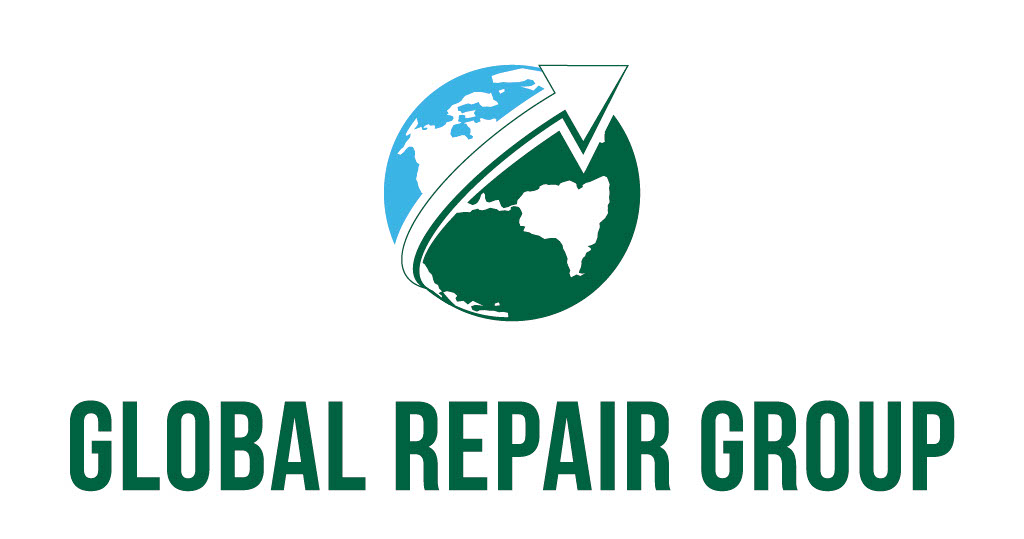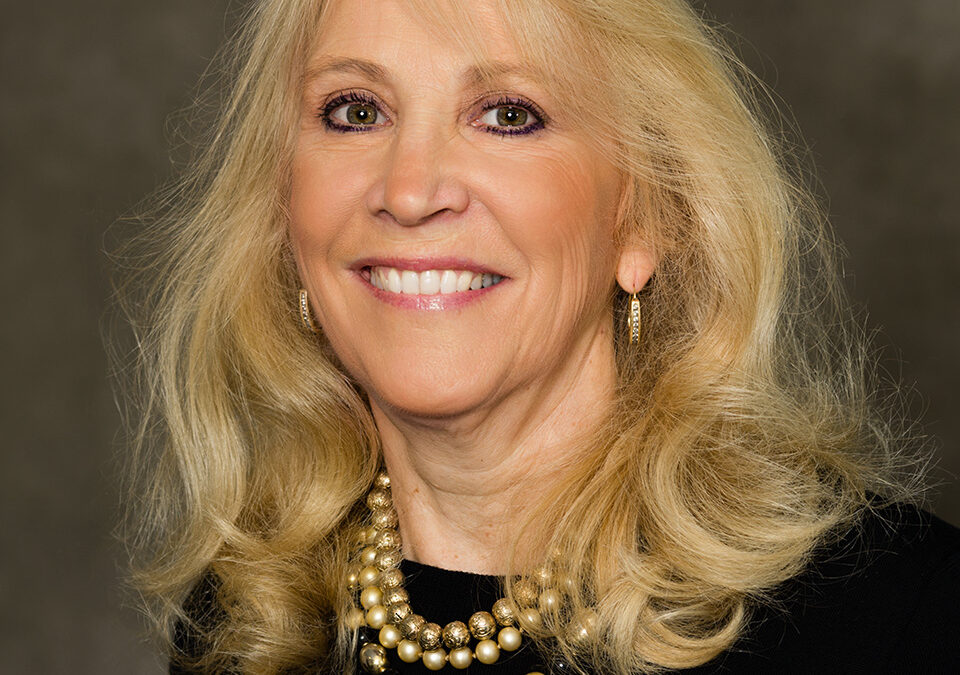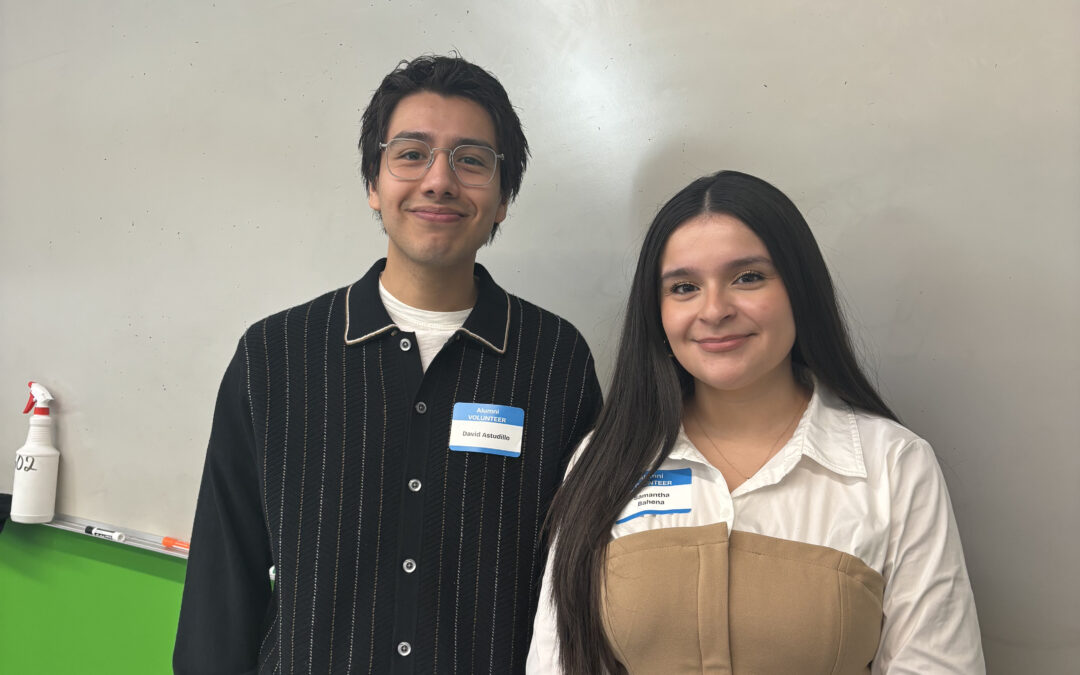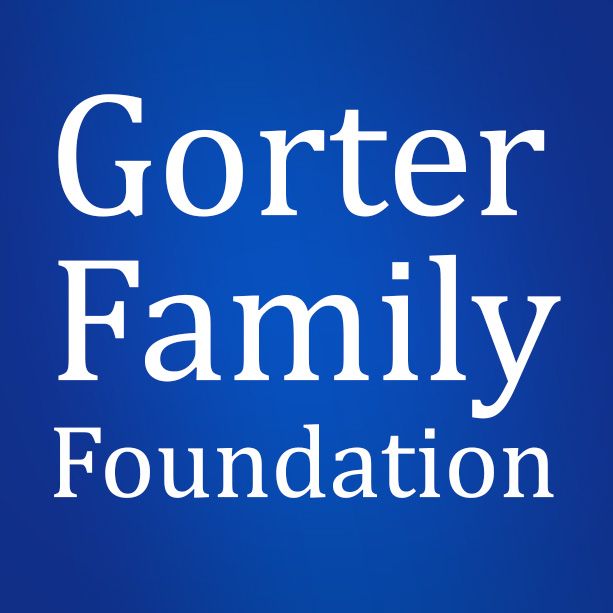by Miranda Eby | Feb 24, 2026 | President’s Pen
Last assembly, they got me. Not just our Principal, who incidentally is very good at keeping a secret, but the whole darn school. Granted, Mike Odiotti was definitely the ring leader. A recurring agenda item at every weekly assembly is “Celebrating Success.” Mike asked if I would be willing to say a few words as our CFO was going to be highlighted for recently earning her MBA from Northwestern’s prestigious Kellogg Graduate School of Management, where I had also earned my master’s many, many years ago. Of course, I agreed.
Viridiana has a remarkable story and she is not done yet. The oldest in her family, she is a model of grit and determination. After graduating CRSM, she got her Medical Assistant certification and worked in healthcare while earning her associates degree. She then went on to get her bachelor’s in accounting, all the while working to pay for it, and finally, getting her master’s in the Executive program while working at CRSM. She is the first alum of any Cristo Rey school (there are now 41 around the country) to come back to her alma mater as a member of its Leadership Team.
So, there I was, in front of the entire school, singing Viridiana’s praises and trying to bring the whole talk back to the idea of ‘collective success.’ This concept was coined by our first alumna to graduate from Dartmouth. She came back to address the students a few years ago, saying that her personal achievement really meant very little as a stand-alone degree. What was far more important was finding ways to lift up her community. We speak of collective success to remind ourselves that no one truly achieves success alone. Somewhere, at some time, there have always been other people to support us, to help us, to stand by us, and to challenge us along the way. When we celebrate one, we really celebrate all who have made the one’s success possible.
I was pretty proud of myself when I finally handed the microphone back to Viridiana for her to say a few words about her accomplishment but, what was my surprise when she started talking about me! It took me several beats to realize what was happening… they got me!
January marked my 30th year working for the Cristo Rey movement. My first day of work back in 1996 was the day the Chicago Jesuits held a press conference announcing they were opening a new high school for the immigrant families in the Pilsen neighborhood. Fr. John Foley, SJ returned from 34 years in Peru to be the school’s first president. Sr. Judy Murphy, OSB, an accomplished educator and former president of St. Scholastica HS on the north side was the Principal. The school was to be funded by students working in real jobs while attending school. I was brought on as the CFO and Director of the innovative Corporate Work Study Program to take the idea and make it a reality. What started as a single school meant to meet the needs of a local community, blossomed in to 41 schools and still growing!
John Foley would always marvel as we grew and grew, “This whole thing is bigger than all of us! The best we can do is hold on and try not to get in the way!” He also reminded us frequently that this was God’s work, not ours. To this day, my mantra to myself and my team is this: We can’t truly know what God wants, but if we put our students’ best interests at the center of our decision-making, then we have our best chance of getting close! That’s what John Foley taught me and still teaches me. It’s not about us. It’s about humbling ourselves to be receptive and available for what we think God might want.
Since that fateful day in 1996, Cristo Rey Schools have graduated over 33,000 students with another 12,000 actively enrolled on their way to graduation, their parents and families sacrificing so much to give them a shot at a better future through the power of a quality education. Thousands of faculty and staff (and former faculty and staff) accompany those students on their life journeys. Even more thousands of corporate managers, supervisors, and coworkers guide and enlighten our students on their career possibilities and help them realize what positive impacts their choices can make on society. And finally, the thousands and thousands of donors who see the potential for our young people and invest their hard-earned money to fund those dreams. It’s mindboggling!
As Viridiana finished sharing the amazing words she said about me, the whole school rose to give me a standing ovation. I was overwhelmed. I still am. What’s clear to me is that this is God’s work. We are a small part of something bigger than all of us.
I am most proud of what we have done together at Cristo Rey St. Martin College Prep, taking a struggling school about to close and steering it toward its real potential to be, not just the best school in the entire Cristo Rey Network (which we are), but the very best college prep school period. We are not there yet. In fact, we will never get there because the potential of our young people and our community defies imagination. We have the potential to always be better than our best.
Margaret Mead famously said, “Never underestimate the power of a few committed people to change the world. Indeed, it is the only thing that ever has.” I would only add that the commitment has to be rooted in an unwavering faith in God’s love, regardless of your religious tradition. As Ken Untener expressed so eloquently in his prayer attributed to St. Oscar Romero:
“…We accomplish in our lifetime only a tiny fraction of
the magnificent enterprise that is God’s work.
Nothing we do is complete,
which is another way of saying
that the kingdom always lies beyond us…
This is what we are about
We plant seeds that one day will grow.
We water seeds already planted, knowing that they hold future promise.
We lay foundations that will need further development…
…It may be incomplete, but it is a beginning, a step along the way,
an opportunity for God’s grace to enter and do the rest.
We may never see the end results,
but that is the difference between the master builder and the worker.
We are workers, not master builders,
ministers, not messiahs.
We are prophets of a future not our own.”
Or as Fr. Foley once said, “Our world is awash in grace. Grace makes us excited about the future. The Kingdom is coming and we are an essential part of that dream!”
¡Viva Cristo Rey!

by Miranda Eby | Feb 24, 2026 | CWSP, School News
We are excited to announce a new partnership with Global Repair Group, a mission-driven organization that supports airlines and travelers by ensuring mobility equipment- such as walkers and wheelchairs- is repaired, replaced, or recovered when it is damaged or lost in transit.
This partnership began in January and brings together shared values around service, professional development, and giving back. We recently spoke with Paulette Bizar, who manages Human Resources and the technician network at Global Repair Group across the United States and internationally, about why this collaboration felt like the right fit.
Paulette has been familiar with Cristo Rey St. Martin for years and has interviewed many students at job fairs and events. “When we see CRSM on a resume, it really stands out,” she shared. “Students who have been through Cristo Rey have superior professional skills. Their preparation and confidence truly show during interviews.”
The partnership aligned well with Global Repair Group’s transition to a new software system and its desire to involve students in meaningful, hands-on work. As part of a one-semester pilot program, four CRSM students are gaining experience in bill paying, accounting support, inventory management, and entering parts into the company’s system. In the coming weeks, students will also begin answering phones and assisting with customer calls, while being included in team meetings to learn more about professional collaboration.
“What has impressed me most is their dedication,” Paulette said. “It is fun to watch students build confidence and really find their voice. Getting to know them as people, not just interns, has been a joy.”
For Paulette, who has been with Global Repair Group for eight years, giving back is central to her work. “We help people every day, and this partnership is another way to do that. We are proud to be part of the Cristo Rey St. Martin mission. It helps us too, because students bring new ideas, energy, and a reminder that company culture matters just as much as the work itself.”
We are grateful to Global Repair Group and Paulette Bizar for investing in our students and creating a welcoming, professional environment where they can learn, contribute, and grow.

by Miranda Eby | Feb 24, 2026 | CWSP, School News
Susan Carsello knows a thing or two about smart investments. By day, she works in the investment business. Outside of work, she invests her time and energy in Cristo Rey St. Martin as a member of the Ignatian Volunteer Corps, and she says the return is immeasurable.
“I truly believe in the mission at CRSM,” Susan shares. “Giving students the opportunity to experience the workplace at a young age is incredibly powerful. Between the CWSP program and the great teachers, it is a really special place.”
Susan comes from a family of educators, with two sisters who are high school teachers. As a working professional and a mother raising two boys, mentoring students feels especially meaningful to her. While she once visited students regularly at their workplaces, she now spends more time checking in with them after work, especially those who may be struggling academically.
“Sometimes it is just sitting down with a student who has not been submitting assignments and helping them focus on one thing at a time,” she says. “Those conversations matter.”
Susan often works with students using The 7 Habits of Highly Effective Teens, asking them to read the book and reflect on what they learn from it. One student she worked with initially struggled with attitude and accountability. When Susan learned he was a soccer player, she helped him see the connection between expectations on the field and expectations in the workplace.
“That was the moment things started to change,” Susan recalls.
By the end of the school year, the student spoke at a school event and publicly thanked Mrs. Carsello for believing in him. In another case, a student who had been struggling at her workplace completed the 7 Habits and later wrote Susan an email describing the positive changes others had noticed in her growth. Susan proudly shared that message with Preston.
“It is such a rewarding experience,” Susan says. “I feel like I get just as much out of this as the students do.”
For Susan, being part of the CRSM community is more than volunteering. It is a true blessing to work alongside the students, staff, and supporters who make the mission possible.

by Miranda Eby | Feb 23, 2026 | Alumni Spotlight, CWSP, School News
On February 13, the Corporate Work Study Program hosted a dynamic Professional Development Day designed to equip sophomores and seniors with essential tools for future success.
The day began with seniors focusing on building their professional presence. Students created and enhanced their LinkedIn profiles, learning to effectively showcase their skills, experience, and career interests. Seniors also participated in a CRSM Alumni Panel, where graduates shared real-world advice about navigating college, launching careers, and adjusting to life after CRSM. The panel provided valuable insight and inspiration as students prepare for their next chapter.
Among the alumni panelists was Samantha Bahena ’17, who reflected on the importance of giving back: “I’m proud to give back and support the next generation of Cristo Rey students! It’s so rewarding to see students gain confidence, skills, and insights to help them succeed.”
In the afternoon, sophomores participated in a hands-on resume-building workshop. With the support of dedicated volunteers from our incredible business partners and community organizations, students worked one-on-one to develop strong first drafts of their resumes. The experience gave students practical skills and increased confidence as they began building their professional portfolios.
We are deeply grateful to our alumni and CRSM business partners who generously shared their time, expertise, and encouragement. Their investment in our students continues to make a meaningful impact as we prepare the next generation for college, career, and life beyond CRSM.

by Miranda Eby | Feb 23, 2026 | Development, School News
Since 2004, the Gorter Family Foundation has been a committed partner of Cristo Rey St. Martin. After joining a philanthropic bus tour of Northern Lake County, the Gorters stopped at the old campus on Martin Luther King Jr. Avenue. The Gorters were inspired by the mission and the students they met there, and they began by funding modular classrooms and soon after helped launch student internships, including the first grants that placed students in nonprofit jobs.
Education in Lake County is central to the Foundation’s giving. “We want to help level the playing field so that all kids in Lake County have access to strong educational opportunities,” says Cheri Richardson, Executive Director since 2014. With a background at United Way of the North Shore and Mothers Trust, Cheri stays closely connected to community needs. “I love being able to support CRSM and continue this longstanding partnership.”
That relationship has continued to grow. The Foundation helped make CRSM’s new, safe campus at the former Kmart location possible.
“We were thrilled to help build the new safe school at the old Kmart location,” the Foundation shared. “It is wonderful to know there is a welcoming place for students to attend school and thrive.” The Foundation also recognizes the strength of CRSM’s staff.
“The teacher turnover rate is very low, and that is a testament to the support staff receive and their commitment to the organization,” Cheri notes.
For more than two decades, the Gorter Family Foundation has invested in CRSM’s students, facilities, and future. We are deeply grateful for their enduring support and belief in our mission.




